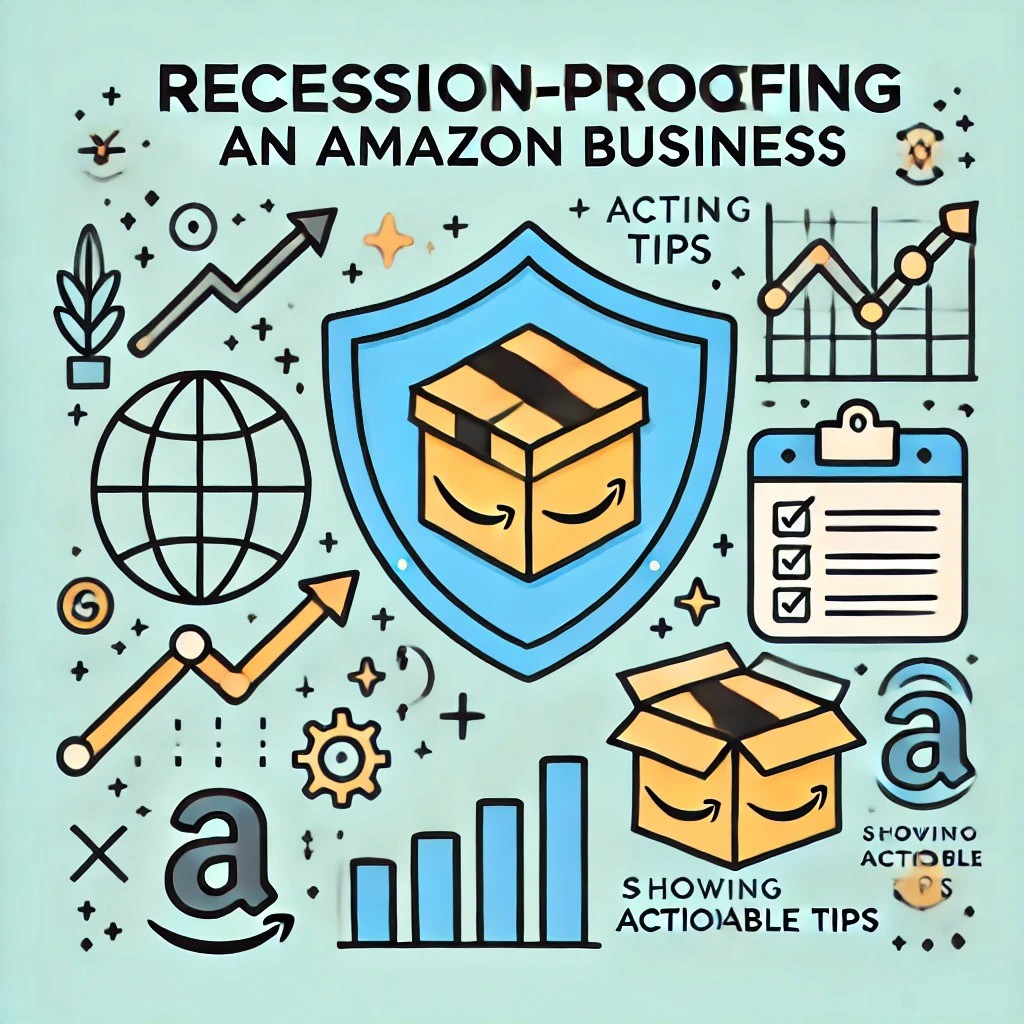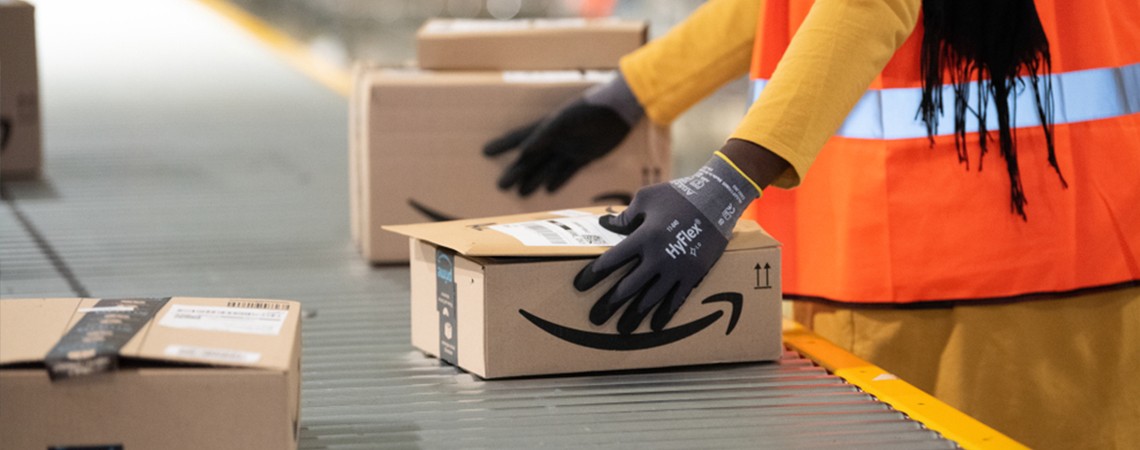Back to Page
Amazon A+ Content
Recession-Proof Your Amazon Business With These Actionable Tips
Recession-Proof Your Amazon Business With These Actionable Tips


Back to Page
Amazon A+ Content
Recession-Proof Your Amazon Business With These Actionable Tips

These are tumultuous times. Inflation has reached its peak in nearly forty years and the economy is about to take a downturn.
As costs rise and customers begin to tighten their wallets, there is a direct impact on Amazon sellers’ profit margins and bottom line. For most brands, it can be a challenge to keep their heads above water.
Recession is inevitable, but it does not have to be overwhelming or threatening. As devastating as it might be, with proper preparation, Amazon sellers can safeguard their business against looming recession and the lingering effects of the pandemic.
In this article, we’ve listed some tips to help Amazon sellers take the right strides and recession-proof their business.
What is recession
A recession is a period of a temporary decline in economic and industrial activity, lasting more than a few months. Signs of recession include low employment, decreased GDP growth, flattening yield curve, and rising asset prices.
Recession is a natural and unavoidable part of any economic cycle. According to Marc Cowling, Professor of Economics and Productivity at Oxford Brookes University, the recession period lasts for about 12-18 months and is followed by a 2-year recovery, a 4-year boom, a year of overheating, and then a new recession.
How badly can the recession affect your Amazon business
During the recession, shoppers choose to divert their funds on food, health, clothing, and personal care products and discourage splashing on luxury goods, furniture, home products, sporting goods, fitness essentials, sporting goods, and other discretionary items.
The ongoing period of slow sales is eventually followed by reduced revenues. Despite the revenue hit, expenses (advertising, FBA, and others) continue to grow and cash flow reduces.
Tips to stay afloat during a recession

The economic turmoil and uncertainty surrounding the recession can be daunting for brands of all sizes. Below we’ve listed some tips that can help brands and sellers equip their businesses to handle these not-so-ideal economic conditions.
#1: Plan NOW so you’re not left scrambling when the economy starts to slow

Most Amazon sellers live on a day-to-day basis. But if you wait longer, it might be too late to turn the ship. Do not wait to see what “actually” happens during a recession. Take the reins and make a plan to storm through the worsening economy.
Instead of dealing with the ups and downs of selling as and when they occur, it is better to carefully map out each aspect of online selling. This can help you identify the weak areas and pinpoint the areas that need improvement.
Go through your catalog and find out which products have the least potential to survive, which products will suffer from declining sales but will survive anyway and which products will flourish during and after the recession. Based on the research, you will be able to make more reliable and confident decisions about your catalog.
We recommend you hire a seasoned Amazon management agency and discuss with them the effects of the recession on your Amazon business.
#2: Highlight your value proposition

What sets your brand and products apart from the competition? Why should customers buy from you and not from your competitors? Is it because your products are 100% handmade and support local workers? Is it because your products are 3rd party tested and trustworthy?
Find those answers and emphasize them in your listing copy, images, and A+ Content. Embracing and highlighting your USPs is what will compel the customers to trust your brand and keep coming back to you.
#3: Engage with your customers

Finding new ways to connect with the customers will keep your brand on top of their minds. Leverage Amazon’s Manage Your Customer Engagement tool to engage with your customers post-purchase or add a product insert asking customers to share their product experience using reviews.
Offering excellent customer service fosters customer loyalty and drives repeat sales. Repeat customers are imperative for businesses to survive through the recession because they often cost less than new customers.
#4: Don’t abruptly cut down on advertising spend

Moving into a recession does not mean you should cut down your marketing budget. As conversion rates may go down and cost per click increases, many advertisers and Amazon marketing consultants choose to pull back on their PPC spend.
Instead, brands should adjust their marketing strategies to reach new customers on and off Amazon. Consider tweaking your advertising message a bit – it can be less aspirational and something that better connects with the customers during these times.
#5: Optimize your finances before the crunch hits

During the recession, most eCommerce businesses find themselves in a “cash flow crunch,” where outgoing expenses are more than incoming revenue.
Recession or not, you’ll need a constant flow of income to run effective advertising campaigns, order inventory, and more. But not all businesses are blessed with a stout war chest. Here’s what businesses can do to remedy the situation:
Wasteful spending can chew away your profits. That’s why you must identify and reduce bad costs to get your finances in order. It can be anything from overuse of office supplies to unproductive workers.
Start building up capital right away so you can have some extra cash on hand to absorb the price bumps.
Sell some assets like machinery or equipment that isn’t critical ATM.
Do not make any significant investments. Recession is a time to focus on improving efficiency rather than making large investments that are full of uncertainties.
#6: Keep on delivering value
Even the most prepared businesses will face the brunt of the downturn. As shoppers tighten their purse strings, sellers are likely to see a drop in revenue. When this happens, a common reaction of a lot of businesses is to slash their prices in order to lure more customers. But doing that can ultimately hurt margins.
Instead of a catalog-wide price cut, we suggest businesses find other ways of offering value to customers. Give them an extended warranty, or bundle similar products together because this way, you can encourage them to try new products from your catalog and even get rid of slow-moving inventory.
#7: Have a backup fulfillment plan ready in place

Amazon has increased fulfillment fees by over 30% since 2020.
Amazon raised the fees to fulfill a 1lb item by 77 cents on June 1, 2021, and by 27 cents on January 18. On April 21, the retail giant added a 5% fuel and inflation surcharge. And finally, the fees were increased by 31 more cents during the holiday season.
Looking at the constantly soaring FBA fees, it is recommended that sellers look for other cheaper fulfillment options if they are not able to afford Amazon’s fulfillment services.
The same applies to drop shipping. Drop shippers don’t have stock on hand, so supply chain disruptions can create problems. Anticipating these changes, businesses should reconsider switching to a more reliable fulfillment model when they can ensure timely delivery to customers.
#8: Get rid of excess inventory

Along with hiking FBA fees, Amazon has also increased storage fees to prevent stock hoarding. During a recession, the demand goes down, and therefore; sellers will need less inventory. Figure out your minimum inventory requirement and stay within those levels to avoid any extra expenses in the form of long-term storage fees.
#9: Stay informed and keep up with the changing customer habits

The market constantly changes and so should your strategy. During the pandemic, the only businesses that survived were the ones that were able to quickly pivot according to changing customer needs. The same applies when it comes to navigating times of economic uncertainties.
Put yourself in the customer’s shoes and keep a close ear to what they are saying. If you have a strong presence outside of Amazon, reach out to your customers and talk to them. Take surveys on what they think about your lineup. This will help you make an informed decision.
#10: Have a solid grip on important KPIs

You’ll have a hard time navigating through the economic slowdown if you don’t have a crystal clear understanding of where your business stands financially.
No matter how bad they look, keep a close watch on critical KPIs like sales (PPC + organic), conversion rates, ACOS, TACOS, and more. These figures will guide you through the economic turbulence and help you understand where and when to fix a problem.
Fight recession, one day at a time
No matter how bad and gloomy it looks today, the recession will end. Being resilient and tightening the belt in some respects can help weather the negative effects of the recession. With a proper strategy in place, brands won’t just survive but thrive through the economic downturn.
Get in touch with our Amazon consultants to get an action plan on how to prepare your business for the tough times ahead.
These are tumultuous times. Inflation has reached its peak in nearly forty years and the economy is about to take a downturn.
As costs rise and customers begin to tighten their wallets, there is a direct impact on Amazon sellers’ profit margins and bottom line. For most brands, it can be a challenge to keep their heads above water.
Recession is inevitable, but it does not have to be overwhelming or threatening. As devastating as it might be, with proper preparation, Amazon sellers can safeguard their business against looming recession and the lingering effects of the pandemic.
In this article, we’ve listed some tips to help Amazon sellers take the right strides and recession-proof their business.
What is recession
A recession is a period of a temporary decline in economic and industrial activity, lasting more than a few months. Signs of recession include low employment, decreased GDP growth, flattening yield curve, and rising asset prices.
Recession is a natural and unavoidable part of any economic cycle. According to Marc Cowling, Professor of Economics and Productivity at Oxford Brookes University, the recession period lasts for about 12-18 months and is followed by a 2-year recovery, a 4-year boom, a year of overheating, and then a new recession.
How badly can the recession affect your Amazon business
During the recession, shoppers choose to divert their funds on food, health, clothing, and personal care products and discourage splashing on luxury goods, furniture, home products, sporting goods, fitness essentials, sporting goods, and other discretionary items.
The ongoing period of slow sales is eventually followed by reduced revenues. Despite the revenue hit, expenses (advertising, FBA, and others) continue to grow and cash flow reduces.
Tips to stay afloat during a recession

The economic turmoil and uncertainty surrounding the recession can be daunting for brands of all sizes. Below we’ve listed some tips that can help brands and sellers equip their businesses to handle these not-so-ideal economic conditions.
#1: Plan NOW so you’re not left scrambling when the economy starts to slow

Most Amazon sellers live on a day-to-day basis. But if you wait longer, it might be too late to turn the ship. Do not wait to see what “actually” happens during a recession. Take the reins and make a plan to storm through the worsening economy.
Instead of dealing with the ups and downs of selling as and when they occur, it is better to carefully map out each aspect of online selling. This can help you identify the weak areas and pinpoint the areas that need improvement.
Go through your catalog and find out which products have the least potential to survive, which products will suffer from declining sales but will survive anyway and which products will flourish during and after the recession. Based on the research, you will be able to make more reliable and confident decisions about your catalog.
We recommend you hire a seasoned Amazon management agency and discuss with them the effects of the recession on your Amazon business.
#2: Highlight your value proposition

What sets your brand and products apart from the competition? Why should customers buy from you and not from your competitors? Is it because your products are 100% handmade and support local workers? Is it because your products are 3rd party tested and trustworthy?
Find those answers and emphasize them in your listing copy, images, and A+ Content. Embracing and highlighting your USPs is what will compel the customers to trust your brand and keep coming back to you.
#3: Engage with your customers

Finding new ways to connect with the customers will keep your brand on top of their minds. Leverage Amazon’s Manage Your Customer Engagement tool to engage with your customers post-purchase or add a product insert asking customers to share their product experience using reviews.
Offering excellent customer service fosters customer loyalty and drives repeat sales. Repeat customers are imperative for businesses to survive through the recession because they often cost less than new customers.
#4: Don’t abruptly cut down on advertising spend

Moving into a recession does not mean you should cut down your marketing budget. As conversion rates may go down and cost per click increases, many advertisers and Amazon marketing consultants choose to pull back on their PPC spend.
Instead, brands should adjust their marketing strategies to reach new customers on and off Amazon. Consider tweaking your advertising message a bit – it can be less aspirational and something that better connects with the customers during these times.
#5: Optimize your finances before the crunch hits

During the recession, most eCommerce businesses find themselves in a “cash flow crunch,” where outgoing expenses are more than incoming revenue.
Recession or not, you’ll need a constant flow of income to run effective advertising campaigns, order inventory, and more. But not all businesses are blessed with a stout war chest. Here’s what businesses can do to remedy the situation:
Wasteful spending can chew away your profits. That’s why you must identify and reduce bad costs to get your finances in order. It can be anything from overuse of office supplies to unproductive workers.
Start building up capital right away so you can have some extra cash on hand to absorb the price bumps.
Sell some assets like machinery or equipment that isn’t critical ATM.
Do not make any significant investments. Recession is a time to focus on improving efficiency rather than making large investments that are full of uncertainties.
#6: Keep on delivering value
Even the most prepared businesses will face the brunt of the downturn. As shoppers tighten their purse strings, sellers are likely to see a drop in revenue. When this happens, a common reaction of a lot of businesses is to slash their prices in order to lure more customers. But doing that can ultimately hurt margins.
Instead of a catalog-wide price cut, we suggest businesses find other ways of offering value to customers. Give them an extended warranty, or bundle similar products together because this way, you can encourage them to try new products from your catalog and even get rid of slow-moving inventory.
#7: Have a backup fulfillment plan ready in place

Amazon has increased fulfillment fees by over 30% since 2020.
Amazon raised the fees to fulfill a 1lb item by 77 cents on June 1, 2021, and by 27 cents on January 18. On April 21, the retail giant added a 5% fuel and inflation surcharge. And finally, the fees were increased by 31 more cents during the holiday season.
Looking at the constantly soaring FBA fees, it is recommended that sellers look for other cheaper fulfillment options if they are not able to afford Amazon’s fulfillment services.
The same applies to drop shipping. Drop shippers don’t have stock on hand, so supply chain disruptions can create problems. Anticipating these changes, businesses should reconsider switching to a more reliable fulfillment model when they can ensure timely delivery to customers.
#8: Get rid of excess inventory

Along with hiking FBA fees, Amazon has also increased storage fees to prevent stock hoarding. During a recession, the demand goes down, and therefore; sellers will need less inventory. Figure out your minimum inventory requirement and stay within those levels to avoid any extra expenses in the form of long-term storage fees.
#9: Stay informed and keep up with the changing customer habits

The market constantly changes and so should your strategy. During the pandemic, the only businesses that survived were the ones that were able to quickly pivot according to changing customer needs. The same applies when it comes to navigating times of economic uncertainties.
Put yourself in the customer’s shoes and keep a close ear to what they are saying. If you have a strong presence outside of Amazon, reach out to your customers and talk to them. Take surveys on what they think about your lineup. This will help you make an informed decision.
#10: Have a solid grip on important KPIs

You’ll have a hard time navigating through the economic slowdown if you don’t have a crystal clear understanding of where your business stands financially.
No matter how bad they look, keep a close watch on critical KPIs like sales (PPC + organic), conversion rates, ACOS, TACOS, and more. These figures will guide you through the economic turbulence and help you understand where and when to fix a problem.
Fight recession, one day at a time
No matter how bad and gloomy it looks today, the recession will end. Being resilient and tightening the belt in some respects can help weather the negative effects of the recession. With a proper strategy in place, brands won’t just survive but thrive through the economic downturn.
Get in touch with our Amazon consultants to get an action plan on how to prepare your business for the tough times ahead.
These are tumultuous times. Inflation has reached its peak in nearly forty years and the economy is about to take a downturn.
As costs rise and customers begin to tighten their wallets, there is a direct impact on Amazon sellers’ profit margins and bottom line. For most brands, it can be a challenge to keep their heads above water.
Recession is inevitable, but it does not have to be overwhelming or threatening. As devastating as it might be, with proper preparation, Amazon sellers can safeguard their business against looming recession and the lingering effects of the pandemic.
In this article, we’ve listed some tips to help Amazon sellers take the right strides and recession-proof their business.
What is recession
A recession is a period of a temporary decline in economic and industrial activity, lasting more than a few months. Signs of recession include low employment, decreased GDP growth, flattening yield curve, and rising asset prices.
Recession is a natural and unavoidable part of any economic cycle. According to Marc Cowling, Professor of Economics and Productivity at Oxford Brookes University, the recession period lasts for about 12-18 months and is followed by a 2-year recovery, a 4-year boom, a year of overheating, and then a new recession.
How badly can the recession affect your Amazon business
During the recession, shoppers choose to divert their funds on food, health, clothing, and personal care products and discourage splashing on luxury goods, furniture, home products, sporting goods, fitness essentials, sporting goods, and other discretionary items.
The ongoing period of slow sales is eventually followed by reduced revenues. Despite the revenue hit, expenses (advertising, FBA, and others) continue to grow and cash flow reduces.
Tips to stay afloat during a recession

The economic turmoil and uncertainty surrounding the recession can be daunting for brands of all sizes. Below we’ve listed some tips that can help brands and sellers equip their businesses to handle these not-so-ideal economic conditions.
#1: Plan NOW so you’re not left scrambling when the economy starts to slow

Most Amazon sellers live on a day-to-day basis. But if you wait longer, it might be too late to turn the ship. Do not wait to see what “actually” happens during a recession. Take the reins and make a plan to storm through the worsening economy.
Instead of dealing with the ups and downs of selling as and when they occur, it is better to carefully map out each aspect of online selling. This can help you identify the weak areas and pinpoint the areas that need improvement.
Go through your catalog and find out which products have the least potential to survive, which products will suffer from declining sales but will survive anyway and which products will flourish during and after the recession. Based on the research, you will be able to make more reliable and confident decisions about your catalog.
We recommend you hire a seasoned Amazon management agency and discuss with them the effects of the recession on your Amazon business.
#2: Highlight your value proposition

What sets your brand and products apart from the competition? Why should customers buy from you and not from your competitors? Is it because your products are 100% handmade and support local workers? Is it because your products are 3rd party tested and trustworthy?
Find those answers and emphasize them in your listing copy, images, and A+ Content. Embracing and highlighting your USPs is what will compel the customers to trust your brand and keep coming back to you.
#3: Engage with your customers

Finding new ways to connect with the customers will keep your brand on top of their minds. Leverage Amazon’s Manage Your Customer Engagement tool to engage with your customers post-purchase or add a product insert asking customers to share their product experience using reviews.
Offering excellent customer service fosters customer loyalty and drives repeat sales. Repeat customers are imperative for businesses to survive through the recession because they often cost less than new customers.
#4: Don’t abruptly cut down on advertising spend

Moving into a recession does not mean you should cut down your marketing budget. As conversion rates may go down and cost per click increases, many advertisers and Amazon marketing consultants choose to pull back on their PPC spend.
Instead, brands should adjust their marketing strategies to reach new customers on and off Amazon. Consider tweaking your advertising message a bit – it can be less aspirational and something that better connects with the customers during these times.
#5: Optimize your finances before the crunch hits

During the recession, most eCommerce businesses find themselves in a “cash flow crunch,” where outgoing expenses are more than incoming revenue.
Recession or not, you’ll need a constant flow of income to run effective advertising campaigns, order inventory, and more. But not all businesses are blessed with a stout war chest. Here’s what businesses can do to remedy the situation:
Wasteful spending can chew away your profits. That’s why you must identify and reduce bad costs to get your finances in order. It can be anything from overuse of office supplies to unproductive workers.
Start building up capital right away so you can have some extra cash on hand to absorb the price bumps.
Sell some assets like machinery or equipment that isn’t critical ATM.
Do not make any significant investments. Recession is a time to focus on improving efficiency rather than making large investments that are full of uncertainties.
#6: Keep on delivering value
Even the most prepared businesses will face the brunt of the downturn. As shoppers tighten their purse strings, sellers are likely to see a drop in revenue. When this happens, a common reaction of a lot of businesses is to slash their prices in order to lure more customers. But doing that can ultimately hurt margins.
Instead of a catalog-wide price cut, we suggest businesses find other ways of offering value to customers. Give them an extended warranty, or bundle similar products together because this way, you can encourage them to try new products from your catalog and even get rid of slow-moving inventory.
#7: Have a backup fulfillment plan ready in place

Amazon has increased fulfillment fees by over 30% since 2020.
Amazon raised the fees to fulfill a 1lb item by 77 cents on June 1, 2021, and by 27 cents on January 18. On April 21, the retail giant added a 5% fuel and inflation surcharge. And finally, the fees were increased by 31 more cents during the holiday season.
Looking at the constantly soaring FBA fees, it is recommended that sellers look for other cheaper fulfillment options if they are not able to afford Amazon’s fulfillment services.
The same applies to drop shipping. Drop shippers don’t have stock on hand, so supply chain disruptions can create problems. Anticipating these changes, businesses should reconsider switching to a more reliable fulfillment model when they can ensure timely delivery to customers.
#8: Get rid of excess inventory

Along with hiking FBA fees, Amazon has also increased storage fees to prevent stock hoarding. During a recession, the demand goes down, and therefore; sellers will need less inventory. Figure out your minimum inventory requirement and stay within those levels to avoid any extra expenses in the form of long-term storage fees.
#9: Stay informed and keep up with the changing customer habits

The market constantly changes and so should your strategy. During the pandemic, the only businesses that survived were the ones that were able to quickly pivot according to changing customer needs. The same applies when it comes to navigating times of economic uncertainties.
Put yourself in the customer’s shoes and keep a close ear to what they are saying. If you have a strong presence outside of Amazon, reach out to your customers and talk to them. Take surveys on what they think about your lineup. This will help you make an informed decision.
#10: Have a solid grip on important KPIs

You’ll have a hard time navigating through the economic slowdown if you don’t have a crystal clear understanding of where your business stands financially.
No matter how bad they look, keep a close watch on critical KPIs like sales (PPC + organic), conversion rates, ACOS, TACOS, and more. These figures will guide you through the economic turbulence and help you understand where and when to fix a problem.
Fight recession, one day at a time
No matter how bad and gloomy it looks today, the recession will end. Being resilient and tightening the belt in some respects can help weather the negative effects of the recession. With a proper strategy in place, brands won’t just survive but thrive through the economic downturn.
Get in touch with our Amazon consultants to get an action plan on how to prepare your business for the tough times ahead.










